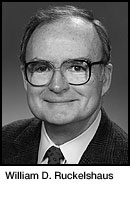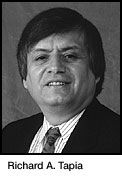|
|
||||
|
|
Three to Receive Honorary Degrees for Contributions to
Science and Technology, and Public Policy
Carnegie Mellon will award honorary doctorates to three distinguished professionals for their outstanding contributions in science and technology, and public policy at its 107th commencement, 11 a.m., Sunday, May 16 in Gesling Stadium on the university campus.
The three recipients are University of Maryland President C.D. Mote Jr., an internationally recognized scholar for his research in dynamic systems and biomechanics; William D. Ruckelshaus, the first administrator of the U.S. Environmental Protection Agency (EPA) and former U.S. assistant attorney general; and Richard A. Tapia, an internationally known researcher in computational and mathematical sciences, and a national leader in educational outreach programs.
Honorary degree recipients were selected by Carnegie Mellon President Jared L. Cohon and a committee headed by Harold Paxton, the U.S. Steel University Professor of Materials Science and Engineering emeritus.
"This year's honorary degree recipients have contributed to our society through innovative thinking, collaboration, hard work and determination, values that this institution was founded on more than 100 years ago. They serve as impressive role models and inspiration to our graduating students and the entire university community," said President Cohon.
C. D. Mote Jr.
Under Mote's leadership, the University of Maryland's academic programs have flourished dramatically. In 2003, the university was ranked 17th among public research universities by U.S. News & World Report, up 13 positions from its ranking in 1998 when he assumed the presidency. He has greatly expanded university partnerships with corporate and federal laboratories, and played a key role in bringing the first Science Research Park sponsored by the People's Republic of China outside of China to College Park in partnership with the university. Under his guidance, the university has created its own research park, the University of Maryland Enterprise Campus. Mote also led the development of a new 20-year Facilities Master Plan, noted for its emphasis on environmental stewardship. Under this plan, more than $100 million in new campus building projects broke ground last year.
Before joining the University of Maryland, Mote served on the University of California, Berkeley, faculty for 31 years, most recently as vice chancellor and FANUC Chair in Mechanical Systems. As president of the University of California's Berkeley Foundation, he led a comprehensive capital campaign that raised $1.4 billion. During his tenure at Berkeley, he was chair of the Mechanical Engineering Department, and under his leadership the department rose to a number one ranking in the National Research Council's review of graduate program effectiveness. Prior to joining the faculty at Berkeley, he began his academic career as assistant professor in the Mechanical Engineering Department at the Carnegie Institute of Technology from 1964 to 1967.
Mote has authored and co-authored more than 300 publications in dynamic systems and biomechanics, and holds patents in the United States, Norway, Finland and Sweden. He has received numerous honors, including the prestigious Humboldt Prize, awarded by the Federal Republic of Germany. He is a member of the U.S. National Academy of Engineering and was elected to Honorary Membership in ASME International, its most distinguished honor. Mote holds several honorary degrees and is a Fellow of the Acoustical Society of America and the American Association for the Advancement of Science. He has served on advisory boards to numerous mechanical engineering departments, including Carnegie Mellon's.
Mote serves on the Technology Council of Maryland and is co-chair of the Potomac Conference of the Greater Washington Board of Trade. He was recognized in Washington Business Forward magazine as one of the 20 most influential leaders in the metropolitan Washington area.
He and his wife, Patsy, have two children and four grandchildren.
William D. Ruckelshaus
After earning his law degree from Harvard University in 1960, Ruckelshaus began his career at the Indianapolis firm of Ruckelshaus, Bobbitt and O'Connor, where he remained for eight years. During that time he also served the state of Indiana, first as deputy attorney general, then as a member of the Indiana House of Representatives, including a term as majority leader. In 1969 and 1970, President Nixon appointed him assistant attorney general in charge of the Civil Division for the U.S. Department of Justice.
Ruckelshaus became the EPA's first administrator when the agency was formed in 1970, and served in that role until 1973, when he was appointed acting director of the Federal Bureau of Investigation, and then deputy attorney general of the U.S. Department of Justice.
From 1974 through 1976, Ruckelshaus was a senior partner in the Washington, D.C., law firm of Ruckelshaus, Beveridge & Fairbanks. He then joined Weyerhaeuser Company in Tacoma, Wash., as senior vice president for law and corporate affairs, a position he held until 1983. In 1983, President Reagan appointed him to a second term as EPA Administrator, and he served in that capacity until he joined the Seattle-based law firm Perkins Coie in 1985. In 1988, Ruckelshaus began his tenure at Browning-Ferris Industries, where he was chairman until he moved to his current position at Madrona Investment Group in 1999.
Ruckelshaus is an active member of several boards and committees for nonprofit organizations. He is chairman of the Salmon Recovery Funding Board for the State of Washington, chairman for the University of Washington and Washington State University Policy Consensus Center, and chairman of the World Resources Institute in Washington, D.C. He was appointed by President Bush to the Commission on Ocean Policy in 2001, and is also on the National Oceanic and Atmospheric Administration's Science Advisory Board.
He and his wife, Jill, reside in Seattle.
Richard A. Tapia
Tapia earned his bachelor's, master's and doctor's degrees in mathematics from the University of California, Los Angeles. He currently is the Noah Harding Professor of Computational and Applied Mathematics at Rice University, where he is also associate director of graduate studies in the Office of Research and Graduate Studies, and director of the Center for Excellence and Equity in Education. Tapia is also an adjunct faculty member of the Baylor College of Medicine and the University of Houston.
An author and co-author of two books and more than 80 mathematical research papers, Tapia has delivered numerous invited addresses at national and international mathematical conferences and serves on several national advisory boards. He led Rice University to national prominence for its educational outreach programs and leadership in producing women and under-represented minority Ph.D. recipients in mathematical sciences. Tapia's programs have impacted hundreds of students and teachers through research opportunities and summer programs, such as the Mathematical and Computational Sciences Awareness workshop and GirlTECH.
Tapia became the first native-born Hispanic to be elected to the prestigious National Academy of Engineering. President Clinton appointed him to the National Science Board, the governing body of the National Science Foundation in 1996. His numerous service awards include the Lifetime Mentor Award from the American Association for the Advancement of Science, the Presidential Award for Excellence in Science, Mathematics, and Engineering Mentoring, and in 1994, the inaugural A. Nico Habermann Award from the Computer Research Association for outstanding contributions in aiding under-represented groups within the computing research community. This year, he received the American Mathematical Society Award for Distinguished Public Service and the Society for Industrial and Applied Mathematics Award for Distinguished Public Service.
His work at improving representation has been celebrated with an ongoing symposium sponsored by Computer Research Association (CRA) and the Association for Computing Machinery (ACM) entitled "The Richard Tapia Celebration of Diversity in Computing," and a lecture series established by Cornell University entitled "The David Blackwell and Richard Tapia Lecture Series" which also honors African-American mathematician David Blackwell from the University of California, Berkeley.
He and his wife, Jean, reside in Houston, Texas.
|
||
|
Carnegie Mellon Home |
||||
 C. D. Mote Jr., internationally recognized for his research in dynamic systems and biomechanics, will receive an honorary doctorate in science and technology. Mote is president of the University of Maryland, where he is also the Glenn L. Martin Institute Professor of Engineering.
C. D. Mote Jr., internationally recognized for his research in dynamic systems and biomechanics, will receive an honorary doctorate in science and technology. Mote is president of the University of Maryland, where he is also the Glenn L. Martin Institute Professor of Engineering.
 William D. Ruckelshaus, the first administrator of the United States Environmental Protection Agency (EPA), will receive an honorary doctorate of public policy for his commitment to government, business and community service. Ruckelshaus is a strategic director of the Madrona Venture Group and a principal in Madrona Investment Group, L.L.C., a Seattle-based investment company. He also serves as a director of several other corporations including Cummins Engine Company, Nordstrom, Inc., Vykor, Inc., and Weyerhaeuser Company.
William D. Ruckelshaus, the first administrator of the United States Environmental Protection Agency (EPA), will receive an honorary doctorate of public policy for his commitment to government, business and community service. Ruckelshaus is a strategic director of the Madrona Venture Group and a principal in Madrona Investment Group, L.L.C., a Seattle-based investment company. He also serves as a director of several other corporations including Cummins Engine Company, Nordstrom, Inc., Vykor, Inc., and Weyerhaeuser Company.
 Richard A. Tapia, an internationally known researcher in computational and mathematical sciences, and a national leader in educational outreach programs, will be awarded an honorary doctorate in science and technology.
Richard A. Tapia, an internationally known researcher in computational and mathematical sciences, and a national leader in educational outreach programs, will be awarded an honorary doctorate in science and technology.